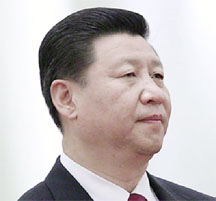The most interesting thing about China’s new President Xi Jinping’s first official trip to Latin America was that he did not set foot in Cuba, Venezuela or any other of China’s political allies in the region — which would have received a huge propaganda boost from such a visit.
Instead, during his eight-day Latin America tour, Xi visited Trinidad and Tobago, Costa Rica and Mexico, some of the region’s closest US allies. From there, he flew to California for a meeting with President Barack Obama.
The conventional wisdom among US analysts is that Xi’s choice of countries to visit during his Latin America tour — and the fact that he was the first Chinese president in recent memory who did not stop in Cuba during a hemispheric visit — are part of China’s growing courtship of Latin America and the Caribbean, and that it may also signal that the new Chinese leader focused on business rather than politics.
 But judging from what I’m hearing from diplomatic sources in Beijing and Latin America, that may be the least important part of the story. Rather, Xi’s choice of Latin American stopovers was a tit-for-tat for Obama’s recent visit to Myanmar. It was Xi’s way of telling Washington: “You go to my backyard, I go to yours.”
But judging from what I’m hearing from diplomatic sources in Beijing and Latin America, that may be the least important part of the story. Rather, Xi’s choice of Latin American stopovers was a tit-for-tat for Obama’s recent visit to Myanmar. It was Xi’s way of telling Washington: “You go to my backyard, I go to yours.”
It may be no coincidence that Xi visited Costa Rica and Mexico, the two Latin American countries that Obama visited last month, and Trinidad and Tobago, the only Caribbean country that Vice President Joe Biden visited recently.
And it may be no coincidence that Xi’s trip took place not too long after Obama’s trip to Myanmar, formerly known as Burma, in November, and after former Defense Secretary Leon Panetta’s trip to Vietnam last year.

Those trips, and Obama’s new “Asia pivot” foreign policy seeking, among other things, to enforce maritime rights in the disputed South China Sea, have irked China’s military. Obama announced in 2011 that the United States would expand its presence in the Asia-Pacific region as part of a “re-balancing” of US foreign polic
y.
Xi’s decision to visit close US allies in Latin America may be his way of mollifying China’s military, showing them that — while it would have been easy to visit Cuba and Venezuela, like his predecessors — he is flexing China’s muscles right in front of Washington’s porch.
Outgoing Mexican ambassador to China Jorge Guajardo confirmed to me in a telephone interview from Beijing that Xi’s decision not to stop over in Cuba raised eyebrows within the Chinese capital’s diplomatic community. “[Former President] Hu Jintao never made a trip to the region without stopping in Cuba,” he said.
China’s trade with Latin America has boomed in recent years, reaching $261 billion in 2012, a 9 per cent increase from the previous year, leading some analysts to predict that China will become Latin America’s leading trade partner as early as 2015. It is already the No 1 trading partner of Brazil and Chile, among others.
But others note that just last week, the International Monetary Fund cut this year’s growth forecast for China to 7.7 per cent, from a previous 8 per cent, and that the final growth rate may be even lower than the latest projection. China’s factory activity fell for the first time in seven months in May, an HSBC bank survey shows.
And judging from what I heard during a visit to China a few months ago, I would not be surprised if China’s economy slows down from the 10 per cent annual growth rates of the past decade to half of that in coming years, as China’s rapidly rising salaries result in fewer factory orders, and internal political tensions over issues such as corruption and air pollution rise. That could lead to a slowdown in China’s trade with Latin America, some people I met in Beijing told me.
My opinion: Xi’s Latin American trip was mostly about domestic politics in China. He was trying to appease China’s restless military by responding in kind to Obama’s recent visit Myanmar.
If it were all about business, Xi would have visited Brazil, Chile, Venezuela or Argentina, which are among China’s biggest trading partners in the region. Or he would have announced huge trade and investment agreements with Mexico, Costa Rica or Trinidad & Tobago, which apparently wasn’t the case.
So look at it in a broader context: Xi was sending a message to Washington, and to his own military, that he is a global player who is not afraid of competing with Obama in his own neighbourhood.
© The Miami Herald, 2013. Distributed by Knight Ridder/Tribune Media Services.





